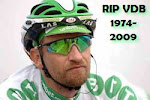 Rather than publish it here, I penned a guest post for the Cozy Beehive: How Cycling Pro's Defeat Anti-Doping Control. It wasn't exactly a hard post to write, since all of the examples came from real-world experience. I left blood-doping (homologous or autologous) off the list for just this reason [that is, my experience with traditional blood doping and my affection for transfusions is limited, to say the least]. But the criminality of it all is not minimized as a result.
Rather than publish it here, I penned a guest post for the Cozy Beehive: How Cycling Pro's Defeat Anti-Doping Control. It wasn't exactly a hard post to write, since all of the examples came from real-world experience. I left blood-doping (homologous or autologous) off the list for just this reason [that is, my experience with traditional blood doping and my affection for transfusions is limited, to say the least]. But the criminality of it all is not minimized as a result. I strongly recommend that you read the piece in its entirety, and then join the debate in the comments section at Cozy Beehive to keep the discussion going (you can also leave comments here if they're meant for me). In a break from past tradition, I will not repost the entire entry here - just an excerpt - so after reading it, head to the Cozy Beehive for the full text, which begins as follows:
There is doping in cycling, no doubt. However, as we have it, there's a fine line between talking about it and not talking about it. If you don't talk about it, like they say, ignorance is bliss and you have a million happy cycling fans who know little of the real going on's of cycling. If you talk about it, suddenly you're a hater of professional athletes and you are giving the business of cycling a bad name.
As the author of this blog, I cannot live with ignorance and naivety. Inaction is worse than silence. If we don't understand what is really going on in our sport, we will not have the power to help clean it up as fans. The best way to understanding the doping issue is through education.
This Guest Post by none other than ex-racer Joe Papp (also a blogger) describes at length how racers subvert and escape doping control. Joe needs no special introduction. He's been there, done that and I think he's a fine candidate to tell us how slippery the pro's can get from the system. How are athletes tricking our intelligence into believing illegitimate sporting performances? Well, find out by reading the following eye-opening article.
When Ron asked if I would be willing to write a guest post for Cozy Beehive, I readily accepted, thinking I’d be able to oblige within a few days. It’s funny how life throws curve-balls, because it’s been a lot longer than that since I promised the piece, and several more drug scandals have hit cycling during the interim. The topic is but a general overview of some of the ways by which riders attempt to defeat anti-doping controls – a course of study that should have been read by Tom Zirbel and Nicklas Axelsson (at least according to their A-sample results).
The counter-measures an athlete will deploy in hopes of beating a doping control are all drawn from the same bag of dirty tricks, though the specific tactic ultimately depends on which doping product the athlete has ingested and where he can find a possible weakness in the testing protocol... continued.






Thanks Joe that was a very good read and I hope you continue to be the spokesman you are currently against doping. our sport is as dirty as it can be and now is the time to change it all .
ReplyDeleteAnon, thanks for your positive feedback. Remember, it's not the sport that is dirty - for it is the most beautiful sport in the world (just imagine the beauty of VDB on a bike when he was a neo pro, even though he'd probably started his medical program). Dirty are the DS's, the team managers, the doctors, the old-school soigneuers, the race organizers who create multi-day events so logistically-challenged that recovery is severely hampered; retired riders who were dopers themselves but are now managers or team bosses (Rominger, Riis). The sport, I say again, is the most beautiful in the world. Her participants are ugly fools in some cases (usually when there is a needle involved)...and hopefully there are fewer of them in the next generation of riders thanks to the efforts of all of you who truly value clean cycling and don't care if the average speed of a race is 2kph slower if that's what it takes to lessen the need for drugs. A pipe-dream maybe, but one worth fighting for when the costs paid by those riders who are caught-up in the culture of doping can still include their lives.
ReplyDeleteRIP, VDB.